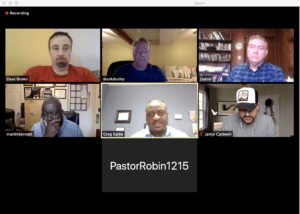Maryland/Delaware Roundup, March 26, 2020

“Under His wings I am safely abiding. Tho’ the night deepens and tempests are wild, still I can trust Him; I know He will keep me. He has redeemed me, and I am His child. Under His wings, under His wings, who from His love can sever? Under His wings my soul shall abide, safely abide forever.”
(A portion of the 19th-century song “Under His Wings,” written by William Cushing. The song’s inspiration is from Psalm 17:8.)
Churches continue to respond to COVID-19 situation
 Jamie Caldwell, the lead pastor of South Shore Church (SSC) in Crownsville, Maryland, said their church is utilizing a Facebook group to gather on Sundays for a live Q&A, following Caldwell’s pre-recorded sermon.
Jamie Caldwell, the lead pastor of South Shore Church (SSC) in Crownsville, Maryland, said their church is utilizing a Facebook group to gather on Sundays for a live Q&A, following Caldwell’s pre-recorded sermon.Bennett and Christian are in contact with church members to offer encouragement and prayer, and to follow-up on any needs, especially during the season of social distancing. They also encourage members to keep in touch with each other through phone calls, text messages, and emails. The leaders become aware of church family needs and prayer requests through these efforts.
The church has three intercessory prayer groups that stand in the gap for the church body each week — a church leaders’ prayer group, two men’s groups, and a women’s group.
There are 15 videos on Youtube which include the audio and the words to the hymns, so you can join in.
BCM/D Disaster Relief COVID-19 Food Assistance Program Cancelled
Please note that due to a change in expected funding, the BCM/D Disaster Relief COVID-19 Food Assistance program has been cancelled. We appreciate all of the churches that responded and were willing to serve. We will share other church opportunities as we become aware of them.
History Highlights
Josephine Norwood (1913-1978) was born in Knightsdale, North Carolina in 1913, but moved to Virginia at age eight. Baptized at eleven, she committed to full-time Christian service four years later and began working as a Richmond church secretary at nineteen. Graduating from William and Mary in 1949, she studied further at the Carver School in Louisville, Kentucky, and the Kent School of Social Work at the University of Louisville before returning to Virginia as associate secretary of that state’s Women’s Missionary Union (WMU). “Sister Jo,” as the Virginians called her, worked to move forward Virginia’s camping program and interracial work.
Norwood developed a reputation for her dedication and executive skills. Her sister-in-law was surprised to meet her on a Richmond city bus one day. Josephine explained her car had been in a slight accident so she was forced to take public transportation to a speaking engagement. In fact, “Sister Jo’s” Crosley car had been hit broadside that day and turned over. Bystanders saw her crawl out of the wreck, straighten her hat, and catch a passing bus that by chance contained her sister-in-law. Blanche Sydnor White, executive secretary of Virginia’s WMU, called Norwood a “whirlwind” who could not touch a piece of work without expanding it.
In 1954, Maryland asked Norwood to lead its WMU. She brought to the Maryland Baptist Union Association’s WMU a leadership reminiscent of Annie Armstrong. Never married, she became a lifelong friend with Elizabeth Willing soon after moving to Maryland, and the two shared a home until Norwood’s death. With her direct leadership style buoyed by businesswoman Willing’s counsel, Norwood gained respect from her peers at the Baptist Building for her determination. In her time, said contemporary Neil Wilson, “The WMU wielded a big stick in Maryland.” One biographer who knew her personally described Norwood as a “prim, proper, and almost austere Virginian lady,” whose drive was not always understood or appreciated by the men with whom she worked.
Understood or not, “Miss Norwood,” as the Marylanders called her, molded the Maryland WMU in her image and had a ministry of considerable and lasting impact. Norwood’s expertise at camping and development put Camp Wo-Me-To in a stronger position as a year-round family camp.
A southern woman described as “raised in a culture where women had not long been released from their status of servitude to men,” she empathized with the poor and vulnerable in society. In 1964, she joined with leaders of the African-American Maryland Baptist Convention and the United Baptist Missionary Convention of Maryland to form United Baptist Women, a small interracial group that worked for reconciliation among all Maryland Baptists. Norwood led WMU leadership teams to churches across the Northeast, contributing greatly to the mission endeavors during the critical early years for many churches.
Those who value the Maryland Baptist heritage owe Norwood a particular debt of gratitude. Over the years, she assembled a large historical collection in the Maryland Baptist Building and promoted historical markers and observances throughout the state. While attending to these significant tasks, Norwood supervised the day-to-day operations of the entire WMU program in the eleven states which comprised the Baptist Convention of Maryland (BCM) territory of her time.
Josephine Norwood led the BCM History Committee to place a plaque on the Shot Tower at Front and Fayette Streets to mark the spot where, in 1773, a half-acre was bought on Jones Falls to erect the first building of First Baptist Church of Baltimoretown.
Hampered by a debilitating illness her last year in office, Miss Norwood fought to the last. She received due praise at her retirement banquet on September 12, 1978, then died thirty-nine days later.
The material used in this biography was taken from, “You Are A Great People,” by W. Loyd Allen
